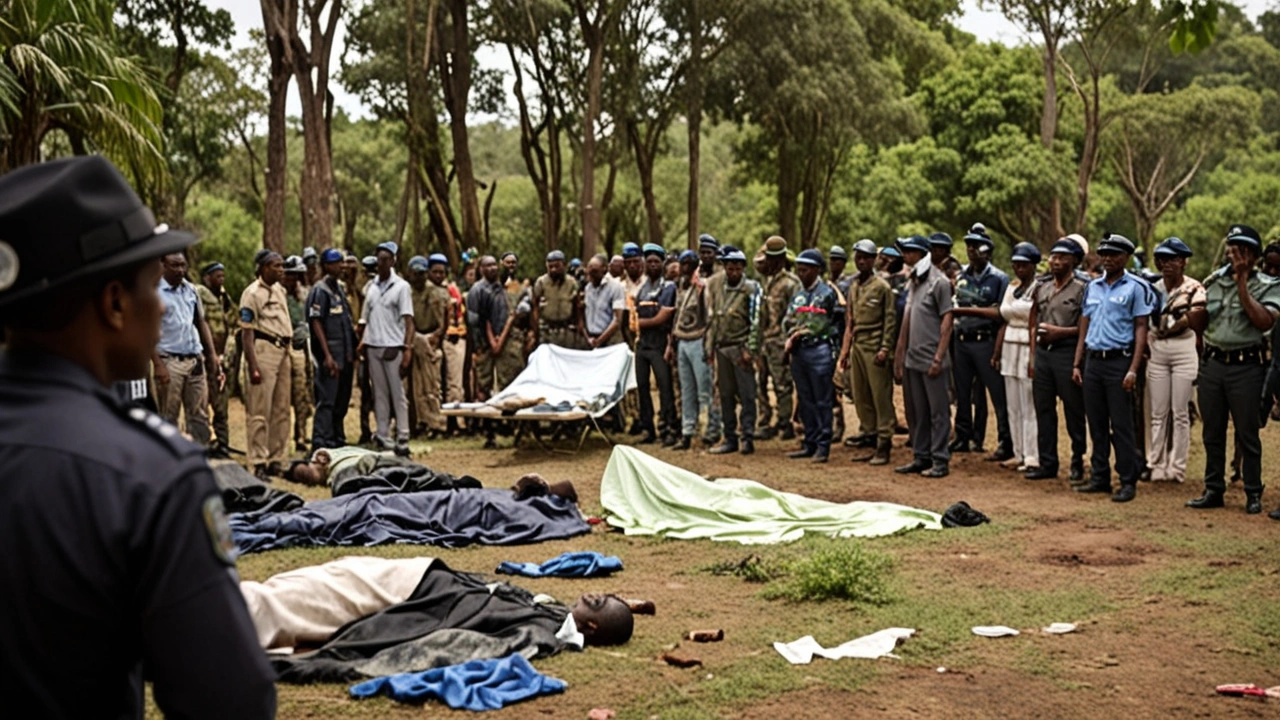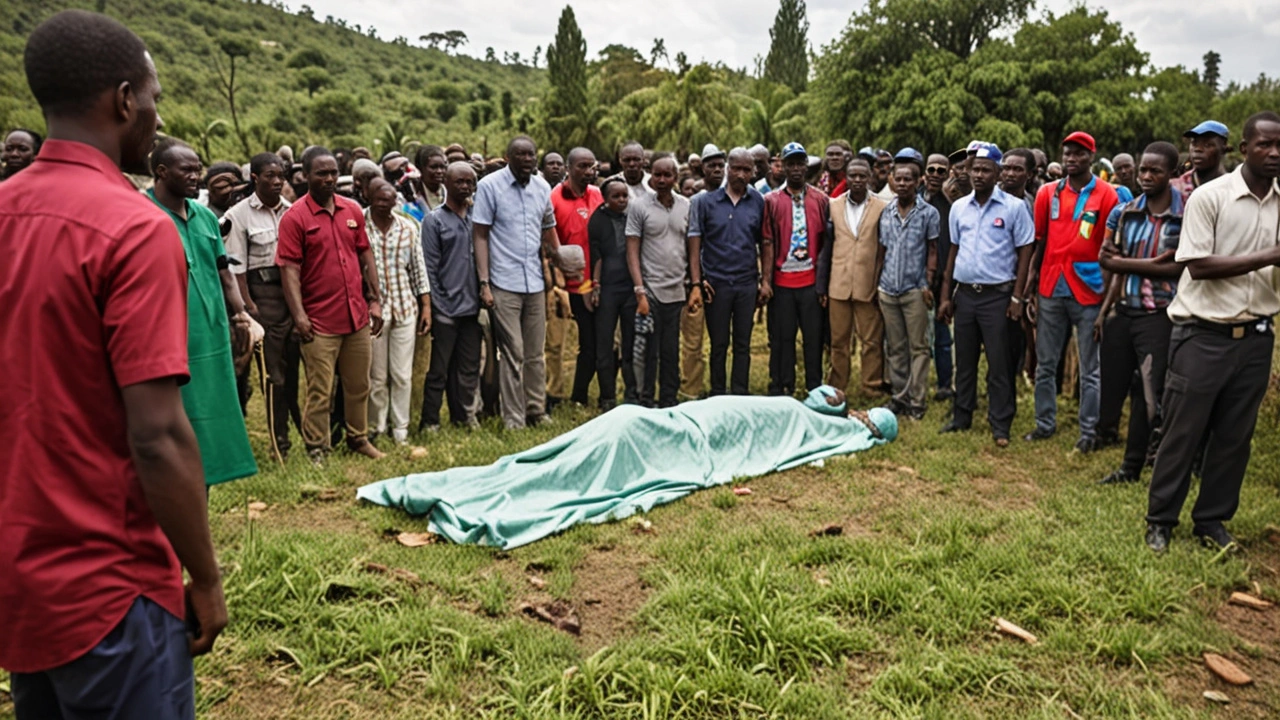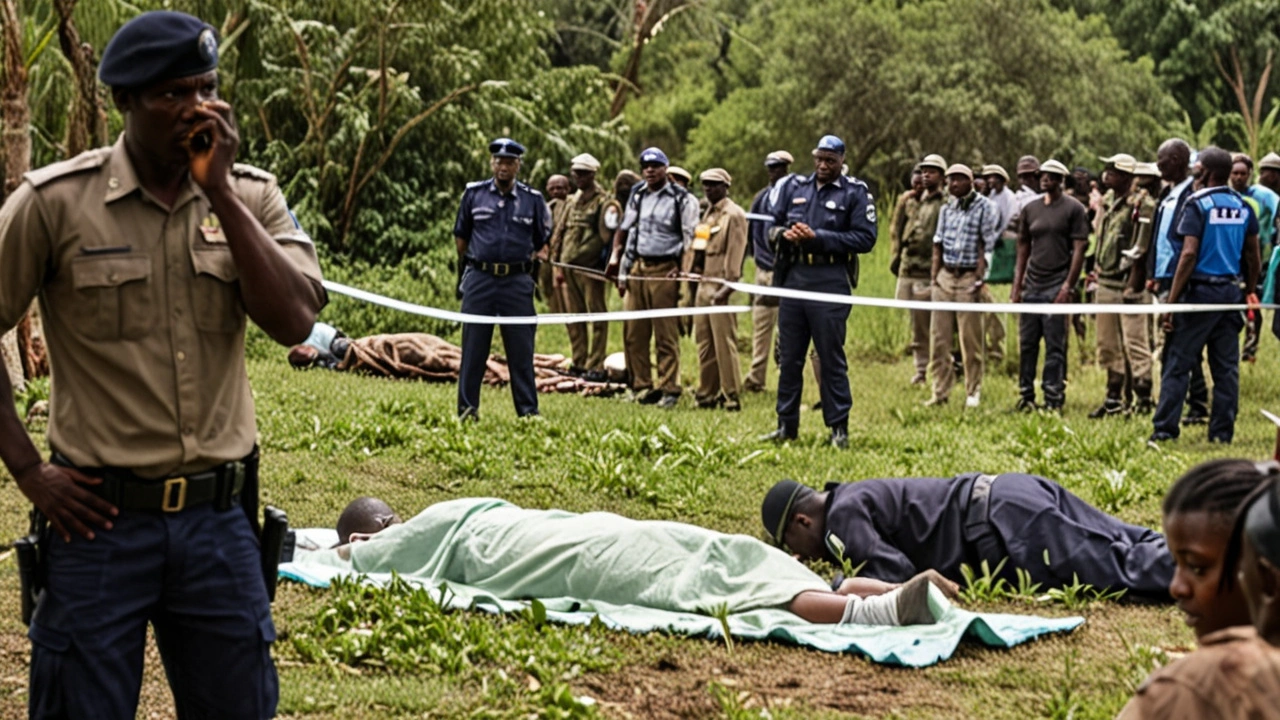A Chilling Discovery in Mukuru Kwa Njenga
Residents of Mukuru Kwa Njenga were gripped by shock and fear following the harrowing discovery of six female bodies in an abandoned quarry. The Directorate of Criminal Investigations (DCI) has since taken control of the area, cordoning it off as a crime scene. The bodies were in various stages of decomposition, carefully wrapped in nylon papers and secured with ropes, indicating a disturbingly methodical approach to the killings. Preliminary investigations have pointed to a consistent mode of killing, suggesting the possibility of a serial offender at large.
Investigative Efforts Take Center Stage
The DCI has mobilized its best homicide detectives and forensic specialists to delve into this chilling case. Early reports suggest that the bodies had been in the quarry for differing lengths of time, complicating the investigative process. Forensic experts are painstakingly analyzing samples from the scene, aiming to identify the victims and piece together their final moments. Given the advanced state of decomposition of some of the bodies, DNA testing and other forensic methods will be crucial in shedding light on their identities.

Community Anxiety and Cooperation
The discovery has rattled the community, with families of missing persons fearing the worst. Social media platforms have seen an outpouring of appeals from anxious relatives, hoping for news of their loved ones. The DCI has appealed to the public for cooperation, urging anyone with information to come forward. Local leaders have echoed this sentiment, emphasizing the need for a united front in the face of such a horrific crime. The authorities have also stepped up patrols in the area to reassure residents and deter any potential criminal activity.
Independent Oversight and Accountability
Amidst the investigation into the Mukuru Kwa Njenga case, the Independent Policing Oversight Authority (IPOA) is concurrently examining the death of Denzel Omondi, a university student who died following a protest against the Finance Bill. The incident has raised questions about police conduct during demonstrations, adding another layer of tension to an already strained community. IPOA's involvement underscores the importance of transparency and accountability in such sensitive matters.
Engaging Forensics and Technology
Forensic specialists are employing a combination of traditional techniques and advanced technology in their efforts to solve this case. The use of cadaver dogs trained to locate human remains, ground-penetrating radar, and 3D crime scene reconstruction tools are all part of the multifaceted approach. These methods not only help in recovering evidence and identifying the victims but also in understanding the series of events that led to their untimely deaths.
The Human Element
At the heart of this tragedy are the victims—mothers, daughters, sisters—whose lives were cruelly cut short. Their stories, once revealed, promise to be poignant reminders of the fragility of life and the pervasive fear that now grips their community. Families awaiting news continue to hold vigils and support one another, their unity providing a semblance of strength amid the calamity. As the DCI works tirelessly to uncover the truth, the hope is that justice will prevail, offering some measure of solace to those left in mourning.

The Broader Impact
Beyond the immediate tragedy, the discovery of the bodies in Mukuru Kwa Njenga raises wider societal questions. Issues of women's safety, the effectiveness of law enforcement, and community vigilance are all thrust into the spotlight. This case serves as a stark reminder of the often unseen battles fought within urban environments, where violence can surge without warning. Activists and community leaders are already calling for renewed efforts to address the root causes of such crimes, advocating for policy changes, and enhanced security measures.
Call for Public Vigilance
Authorities stress the importance of public vigilance in preventing such atrocities. They urge residents to report suspicious activities and maintain open lines of communication with law enforcement agencies. Community groups are encouraged to form safety networks, ensuring that neighbors look out for one another. While the police play a pivotal role in maintaining order, the participation of civilians is crucial in fostering a safe environment for all.
Moving Forward
As the investigation continues, the focus remains firmly on uncovering the truth behind the deaths of these six women. The DCI’s efforts, augmented by community support and technological aids, aim to bring closure to the families and restore a sense of normalcy in Mukuru Kwa Njenga. As more information comes to light, it will hopefully pave the way for justice and prevent future tragedies.


Comments
RUBEN INGA NUÑEZ
The forensic approach in Mukuru Kwa Njenga demonstrates a comprehensive synergy between classic techniques and cutting‑edge technology. Investigators have deployed cadaver dogs to pinpoint human remains, a method proven effective in numerous cold‑case recoveries. Ground‑penetrating radar surveys are mapping subsurface anomalies, allowing crews to target excavation with precision. 3D reconstruction software is being used to model the quarry scene, preserving spatial relationships for courtroom presentation. DNA extraction from degraded tissue is challenging, yet next‑generation sequencing can retrieve genetic profiles even after extensive decomposition. These profiles will be cross‑referenced with national missing‑person databases to expedite victim identification. The consistent rope and nylon wrapping suggests a deliberate modus operandi, hinting at a serial offender with a ritualistic signature. Serial patterns are often linked to distinct victimology, which in this case appears to focus on women in vulnerable circumstances. Community members are being urged to share any sightings of unfamiliar individuals loitering near the quarry at odd hours. Local NGOs have organized neighborhood watch groups, enhancing situational awareness and reporting channels. Police patrols are now equipped with body‑cameras to ensure accountability during interactions. The Independent Policing Oversight Authority’s involvement in parallel cases signals a broader scrutiny of law enforcement practices. Transparency is crucial for maintaining public trust, especially when multiple investigations converge in the same area. Forensic psychologists may be consulted to develop a behavioral profile of the perpetrator, which could narrow suspect pools. Witness protection programs are being reinforced to encourage reluctant informants to come forward without fear. The DCI’s multilateral strategy-combining scientific rigor, community partnership, and legal oversight-sets a strong foundation for achieving justice. Ultimately, swift identification of the victims will provide closure to grieving families and deter future atrocities.
July 13, 2024 at 09:16
Michelle Warren
ugh i cant even with all this drama.
July 27, 2024 at 07:16
Christopher Boles
Hey folks, just wanted to point out that the community’s cooperation can make a huge difference. When neighbors share info early, police can act faster. Let’s keep the lines open and support each other.
August 10, 2024 at 05:16
Crystal Novotny
While solidarity is key, we also need to question why the quarry was left unsecured for so long. Abandoned sites become hotbeds for crime if no one monitors them. A simple fence could have deterred a lot of trouble.
August 24, 2024 at 03:16
Reagan Traphagen
Honestly, this whole thing smells like a cover‑up. The police are too quick to label it a serial killer without solid evidence. They’re probably trying to divert attention from deeper corruption.
September 7, 2024 at 01:16
mark sweeney
Maybe, but think about the victims-six women, all wrapped up. That’s not random. Even if there’s some mishandling, the brutality itself tells a story you can’t just brush off.
September 20, 2024 at 23:16
randy mcgrath
From a philosophical angle, this tragedy forces us to confront how urban neglect breeds violence. When infrastructure decays, safety nets disappear, and crimes like this can thrive. It's a reminder that city planning is also a moral duty.
October 4, 2024 at 21:16
Frankie Mobley
Exactly, and that’s why community groups should push for better lighting and regular patrols around abandoned spaces. Small changes can have a big impact on deterrence.
October 18, 2024 at 19:16
ashli john
Let’s keep the focus on supporting the families right now. Even a simple message of solidarity can lift spirits during such dark times. Keep the love flowing.
November 1, 2024 at 16:16
Kim Chase
Totally agree, but also spread the word about missing persons alerts. Everyone should stay alert and report odd behavior. The more eyes we have, the safer we become.
November 15, 2024 at 14:16
David Werner
Never forget, the government is probably hiding more than they admit. These "official" investigations are just a smokescreen while power players protect their own.
November 29, 2024 at 12:16
Paul KEIL
From a strategic viewpoint, the narrative framing by authorities aims to steer public discourse away from systemic issues-classic PR maneuvering.
December 13, 2024 at 10:16
Horace Wormely
Grammar check: Please ensure all future posts use proper punctuation and spelling to maintain credibility.
December 27, 2024 at 08:16